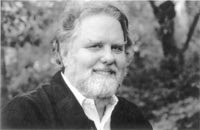
By Tony Evans - Boise Weekly - ID, U.S.A.
Wednesday, May 10, 2006
Coleman Barks will present a reading of 13th Century Sufi mystic poet Jellaludin Rumi with musicians Barry Phillips on cello and Shelley Phillips on harp and woodwinds as a keynote presentation at The Sun Valley Wellness Festival on Sunday, May 28, at 7 p.m., in Sun Valley. Barks' free-verse translations have made Rumi the most read poet in America over the last decade.
"I just love to experiment with putting the spoken word to music," Barks tells BW. "I'm trying to do what the Sufi's call 'Sema,' which is a deep listening. It's a way of letting the words and the images go deeper into the heart where they can become of some use for you."
Born in 1207 in Balkh, Afghanistan, Rumi was a sheikh and scholar who lived during the time of St. Francis of Assisi. His poetry was born of a profound friendship with a mysterious, older wise man named Shams of Tabriz, who lived on the outskirts of society in Konya, Turkey. Legend has it the powerful Shams threw Rumi's books into a fountain, transforming years of religious study into a living mystical reality through long spiritual conversation called "sohbet." When Shams disappeared, perhaps murdered by jealous rivals for Rumi's attention, Rumi entered a deep, ecstatic longing, which resulted in an out-pouring of thousands of poems, including the six volume Matthnavi, which transcended Christian, Jewish and Muslim doctrines, attaining a universal significance which has lasted more than 700 years.
A university professor and poet in his own right, Barks undertook the work of translating Rumi after meeting Sufi holy man Bawa Muhawadeen in a dream in 1977. Over the next nine years, he spent time with Bawa in Philadelphia. "The only authority I have for working on Rumi's poetry is my friendship with Bawa," says Barks. "It's an amazing thing to see. We are not discreet individuals in the presence of an enlightened being, because his knowledge is of the Oneness."
"Religion and poetry both remind us of what is sacred," says Barks, who has studied Rumi's mystical message for more than 30 years. "Spontaneity is more important than coherence. There are as many kinds of mysticism as there are mystics. It has to do with one's personal, unique response to the mystery of being alive and to the mystery we are living within. I think of mystics as mostly being ecstatic," he says. "They feel, like some children do, that just being in a body and sentient is a state of pure rapture. Laughter is real important to these people. The whole thing is so hilarious. They are partial to boomerangs."
The religious scholar Huston Smith describes the Sufis as "spiritually impatient." Rumi's poetry reaches from Koranic and Biblical references to an alchemical symbology which provokes an immediate encounter with the divine. These references include Moses, Jesus, Mohammad and Hallaj, along with many details of the physical world--melting snow, wine, a ruby or reed flute; all resonate with meaning and provide pathways through the endless web of human desires to direct encounter with God.
Rumi's poetry is a call to and through the senses, poking fun at those who would "think" their way to God. In one story he likens theologians and philosophers to a group of fish schooling in the sea to debate the likelihood of the ocean. "When you look for God, God is in the look of your eyes," says Barks. "So close that if we really knew it we would just scream or go quiet, or something. It's almost a joke-- It's so simple that you can hardly say it."
And yet he does:
"Out beyond ideas of wrong-doing and right doing
There is a field. I'll meet you there.
I am so small I can barely be seen.
How can this great love be inside me?
Look at your eyes. They are small, but see enormous things."
"It's not really an entertainment or concert I'm doing," says Barks. "It's some kind of a practice, really. I'm trying to let the transmission of Rumi's poetry and Shams' presence come into this century. Yeah, so I'm hoping for big stuff, but I think it can happen."
Barks recently traveled to Afghanistan as part of a U.S. State Department delegation, reading his translations and networking with Afghan poetry lovers. While reading to a group of government officials in Kabul, a passionate argument broke out among the listeners over Rumi's use of the metaphor of "drunkenness" or ecstatic love, as opposed to that used by the poet Hafiz.
"The culture of poetry in that country is just astonishing," says Barks. "It's just unimaginable in this country that our cabinet members would get in an argument over, say, the difference between Robert Frost and Wallace Stevens. I wish the world leaders would read Rumi, especially this guy that's the head of Iran now. He needs to get a little more gentleness and ecstatic vision in his life. For Rumi, warfare is just unthinkable. It devalues and brutalizes the human psyche so much."
While in Afghanistan, Barks encountered a 95-year old Sufi named Oman Justi who had been teaching Rumi's master work, The Matthnavi for 75 years. "I just leaned against him and said, 'Who is Shams?' He said, 'Shams is the doctor. He comes when you hurt enough. When Rumi was alive the longing was intense enough so that Shams came, but now it is not fiery enough to bring Shams.'"
Rumi is good medicine in these days of crazy religious violence and confusion between nations. Perhaps our own longings have brought us Coleman Barks.





No comments:
Post a Comment